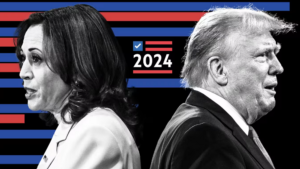Right now, a number of important issues that might affect financial markets are centered in the United States. All eyes will be on the United States due to the much-awaited FOMC meeting in September and the US elections approaching in November. These developments are quite important, not just for established markets but also for cryptocurrency enthusiasts who want laws that will facilitate transactions to be more user-friendly.
For cryptocurrencies, this year has already shown to be historic. With the US approving spot Bitcoin and Ether exchange-traded funds (ETFs), Bitcoin achieved fresh all-time highs and made major strides toward being widely accepted. These significant events demonstrate how digital currencies are becoming more and more integrated into the global economy, paving the way for further political and regulatory scrutiny as the US elections draws near.
The rising influence of younger voters, especially Gen Z and Millennials, who comprise a sizable section of the population, is a critical factor in this US elections season. More than half of these people, according to a Stand With Crypto Alliance study, are inclined to back politicians who support legislation that is favorable to cryptocurrencies. 21% of voters in swing states think crypto policies are significant, and a sizable percentage of them identify as pro-crypto.
Political Candidates’ Stances on Cryptocurrency

Political candidates are being forced by this generational change to discuss cryptocurrency more openly, realizing its significance to a significant portion of the vote. Crypto policies have thus gained prominence among voters and increased influence over the result of the US elections.
The candidates’ stances on cryptocurrency will probably shape the sector’s future. Despite his initial misgivings, former President Donald Trump has since demonstrated his growing support for cryptocurrencies by accepting donations in digital currency and calling for the establishment of a strategic Bitcoin reserve.
Additionally, supporting Bitcoin as a representation of financial freedom and democracy, Robert F. Kennedy Jr.’s endorsement underscores the possibility of pro-crypto legislation under his direction. Following Biden’s resignation, Kamala Harris, the Democratic Party’s nominee in lieu of Biden, stated that she too is in favor of assets and technology like cryptocurrency. These changes indicate that, depending on the winner of the US elections, a more favorable regulatory environment for cryptocurrencies may be implemented.
Macroeconomic Impact: Fed Rate Decisions and Crypto
Macroeconomic variables, such as prospective Fed rate reduction, have a big impact on the cryptocurrency market in addition to the US elections. When the Fed reduces interest rates, the cost of borrowing is usually reduced, which boosts investor risk appetite and stimulates economic activity. In an effort to increase returns, investors frequently shift their money from conventional bonds and savings accounts to alternative assets like gold or cryptocurrency. This is due to lower interest rates.
Rate decreases have historically had a favorable effect on the cryptocurrency market. A more accommodating monetary policy stance, as suggested by recent remarks from Fed Chair Jerome Powell, has already resulted in notable gains in the cryptocurrency market, with Bitcoin hitting fresh highs. Rate reductions and cryptocurrency, however, have a complicated relationship that depends on a number of variables. As of right moment, though, a 25 basis point rate drop in September still seems plausible.
Investors with long-term perspectives may continue to concentrate on cryptocurrencies’ underlying potential, seeing them as a safeguard against inflation and the depreciation of fiat currencies due to loose monetary policy. Large corporations such as MicroStrategy, Tesla, and others have made investments in Bitcoin.
Since the approval of Bitcoin spot ETFs, institutional investors have also shown a strong interest in incorporating Bitcoin into their portfolios. Furthermore, there is a growing body of regulatory clarity regarding cryptocurrency globally, which is expected to drive adoption and demand in the years to come. Furthermore, if the US sets a precedent regarding cryptocurrencies like Bitcoin, other nations will probably follow suit.
Conclusion
Political results and macroeconomic variables will interact critically to determine how the cryptocurrency market develops as the 2024 U.S. elections draws near. Election-related regulatory reforms may encourage the expansion of digital assets, but Fed rate choices will affect investor mood and market liquidity.
When combined, these components offer a favorable atmosphere in which favorable political and economic policies may help cryptocurrencies. Voters not only determine the political course of the country but also impact the trajectory of the global cryptocurrency market, which is why this election cycle is crucial for investors and other industry players.



















